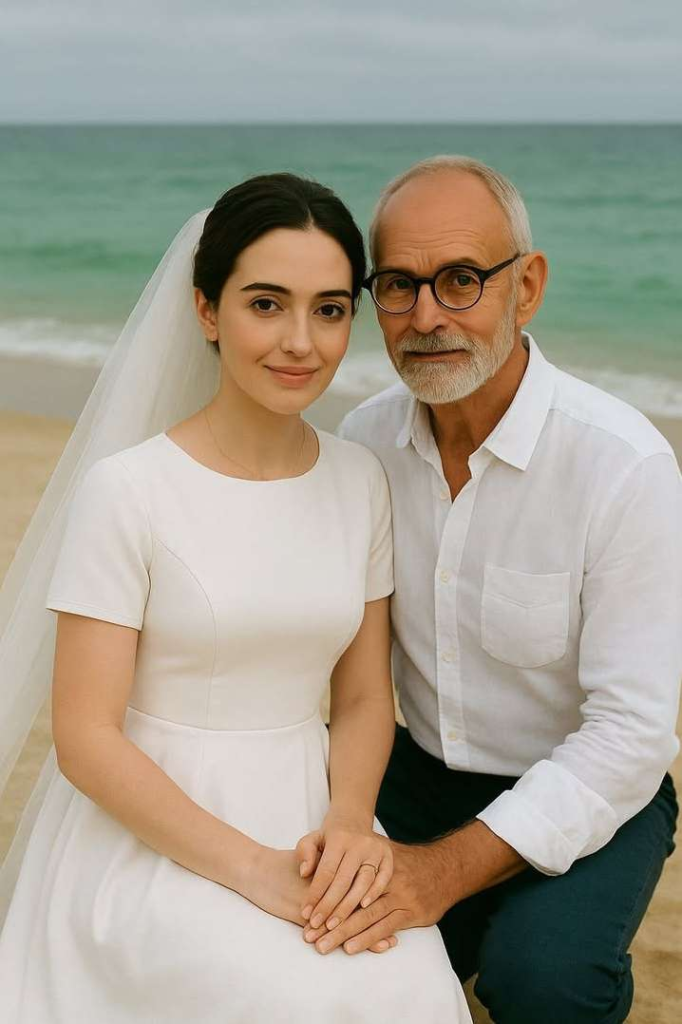
Emily met Jack on a rainy Saturday afternoon, the kind of day where nothing goes quite right and everything feels slightly off. She hadn’t even wanted to attend the wedding that day—it was a distant cousin’s ceremony, and she barely knew anyone there. But she went anyway, wearing a navy blue dress and holding a lukewarm coffee, half wishing she’d just stayed home.
Jack was sitting near the snack table, poking at a cheese platter like it had personally offended him. Their eyes met, and he smiled—not the overconfident kind, but the kind that said, “I’m just as awkward as you are.”
They started talking—about the weather, the ridiculous centerpieces, and how neither of them really knew the bride that well. It was light, unimportant, and yet, oddly comforting.
Three months later, Jack proposed.
No grand gestures. No fireworks. Just the two of them on a quiet park bench, his hands trembling slightly as he pulled out a vintage emerald ring that once belonged to his grandmother.
He worked at a small-town bank. No flashy job title. No penthouse apartment. He spent most weekends taking care of his father, who was living with Parkinson’s.
Emily’s parents were furious.
“You’re giving up a future with a surgeon for a bank clerk?” her mother asked in disbelief.
“He can’t give you the life you deserve,” her sister said. “Do you really want to scrape by while your friends are traveling the world?”
But Emily had made up her mind.
Jack didn’t promise riches. He promised presence. Warmth. Honesty. Safety. And that, to Emily, was worth far more than a six-figure income.
Their wedding was simple.
A small church, a carrot cake baked by Jack’s mother, and a handful of friends who truly cared. Her parents didn’t come. That hurt—but she stood at the altar, looking into Jack’s nervous eyes, and felt at peace.
Life wasn’t easy. They budgeted tightly. Vacations meant road trips in an aging Honda Civic. Nights out were replaced with popcorn and old movies on the couch. But their life was rich in other ways—laughing over burnt toast, dancing in the kitchen, late-night talks under a shared blanket.
They built something solid. Something real.
Until the letter arrived.
It was a Wednesday morning. Jack had just come in from watering the plants when he noticed the envelope—formal, stamped, and unfamiliar. He opened it slowly. As he read, the color drained from his face.
Emily looked up from the kitchen. “What’s wrong?”
Jack took a breath. “It’s from a law firm. My mother’s estate.”
Emily blinked. “Your mom? I thought—”
“She left when I was six. I haven’t seen her since. I thought she disappeared completely.”
Jack sat down.
His mother had passed away two months earlier from cancer. And despite having no relationship with Jack for over 25 years, she had named him as the sole heir to her estate.
A trust fund worth $1.8 million.
Emily was stunned.
They sat in silence, staring at each other across their worn kitchen table. The world felt tilted.
The money changed nothing… and everything.
Suddenly, people who hadn’t called in years were reaching out. Jack’s coworkers started treating him differently. Emily’s parents—who had disowned her for marrying Jack—sent her a long, guilt-filled email asking to “reconnect.”
She felt overwhelmed. And quietly, a dark thought crept in:
“If I had known Jack had money… would I have made the same choice?”
That night, Jack handed her another letter. This one was handwritten—an addendum his mother had left with the will.
“If you’re reading this, Jack, it means I’m gone.
I’m sorry for what I did. I never stopped thinking about you.
I didn’t tell you about the money sooner because I didn’t want it to define you. Or your life. Or who you love.
If you’re with someone now—someone who chose you before they knew—cherish them.
And protect that love from what this money could ruin.”
Emily’s hands trembled as she folded the note.
She looked at Jack—who was still the same man, still her favorite person—and realized that no amount of money could buy the years they had already built together.
They didn’t move into a mansion.
Instead, they repaired the leaky roof on their modest home. They donated a portion to the local library and created a fund to help low-income kids attend college without drowning in debt.
Jack kept working at the bank. Emily started writing again, something she’d set aside long ago. Their life didn’t get flashier—but it got wider. Deeper.
More grounded.
Sometimes, when the world was quiet, they’d sit on their front porch, sipping iced tea and watching the sunset.
And Emily would smile and think: “Thank God I chose him before the letter came.”
Because real love doesn’t come in envelopes.
It comes in the ordinary days you choose each other—over and over again.